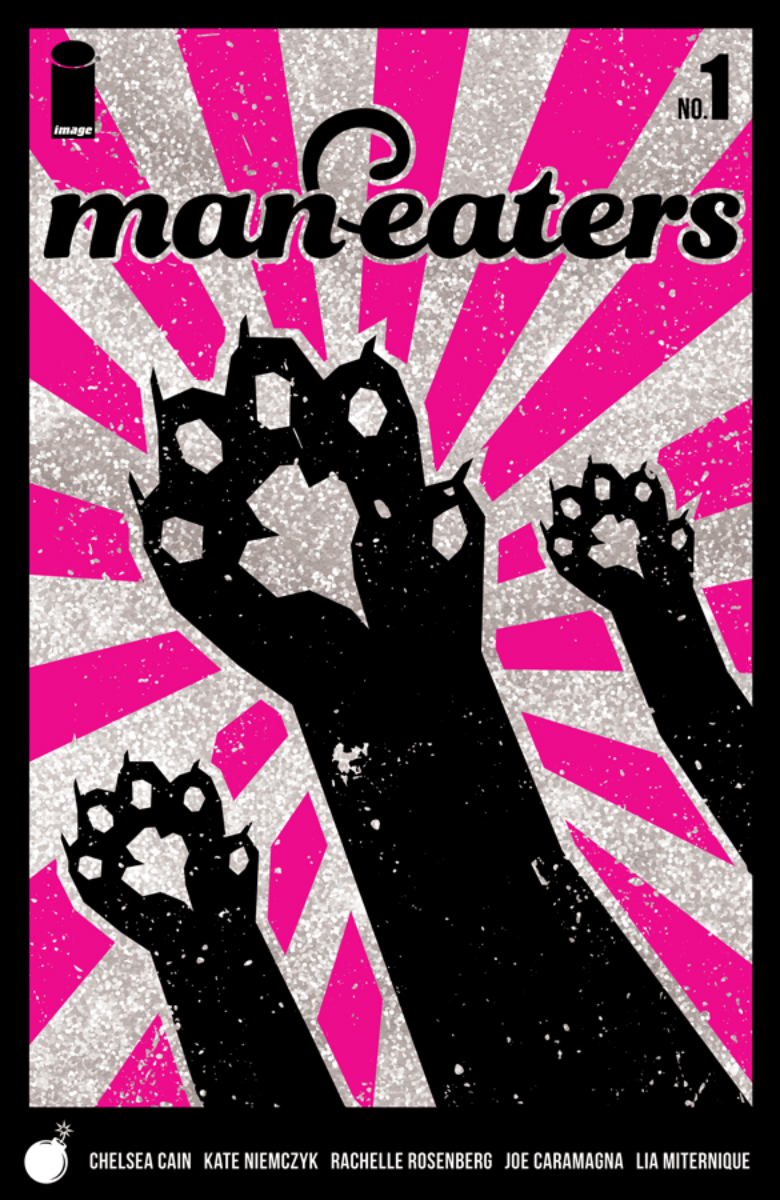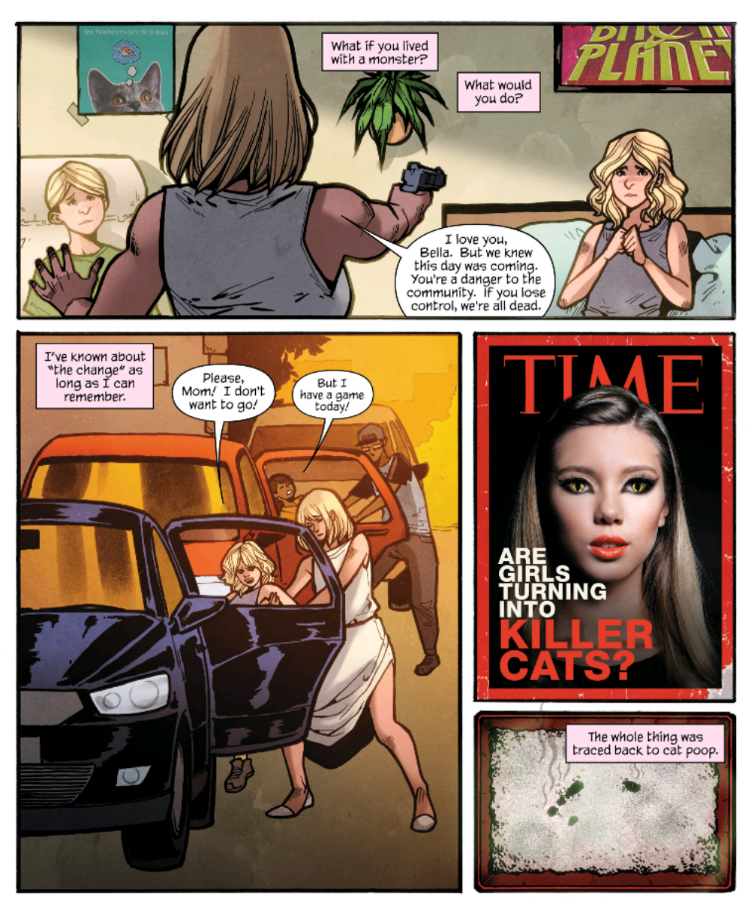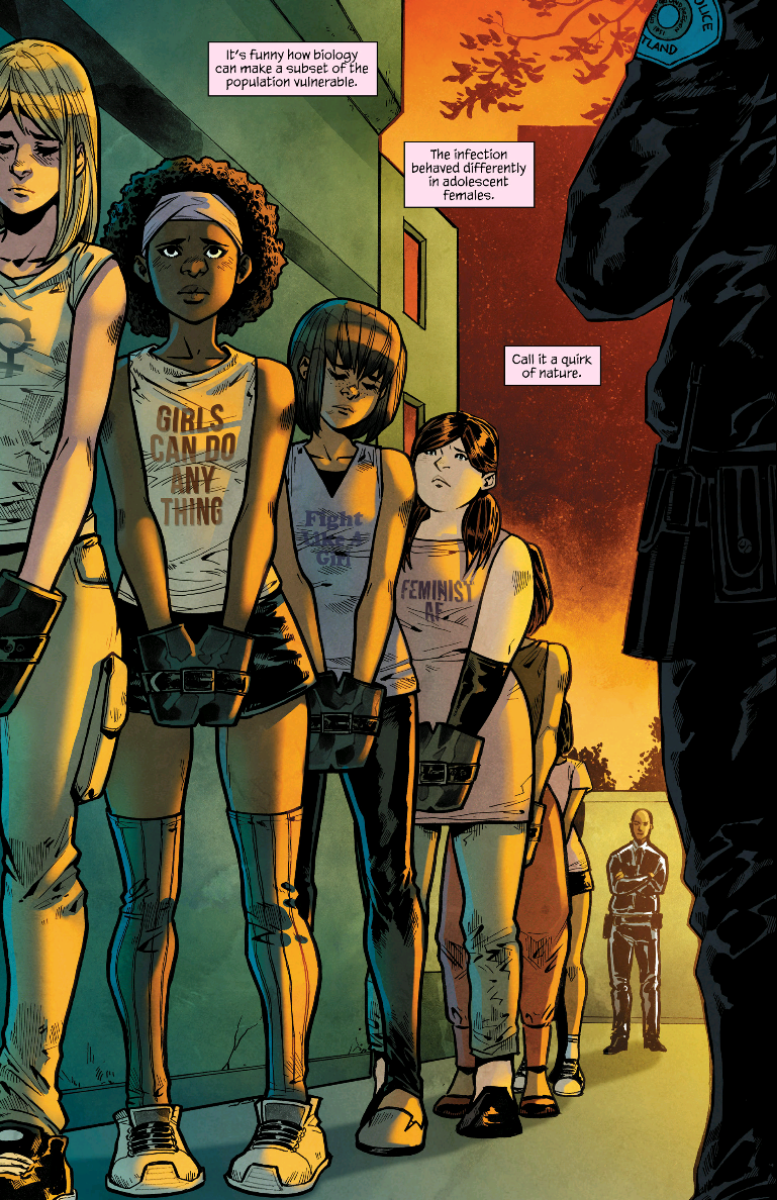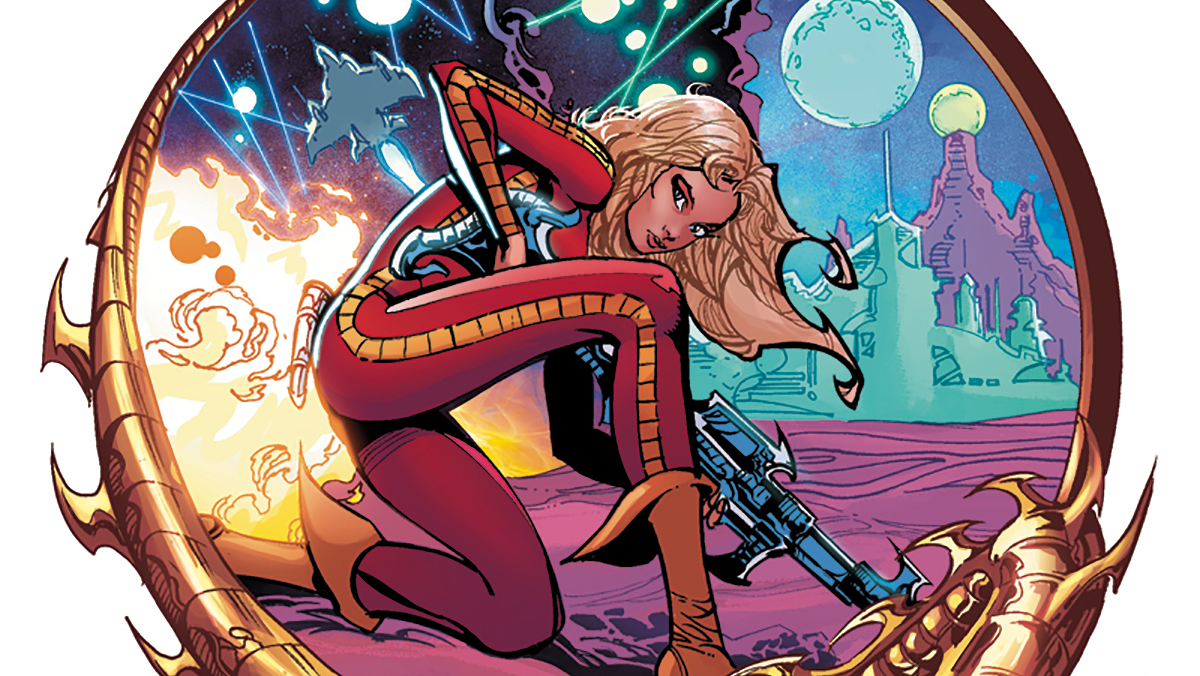Chelsea Cain’s new independent comic, Man-Eaters, is one of the most on-the-nose, direct, no-really-I-mean-it books I’ve read since Bitch Planet. Some people are going to use that to say the comic isn’t very good. They’re going to say that the book should be more subtle, use more metaphor, use a softer tone.

Fork that. (Do you watch The Good Place? It’s the only way I can figure to get through this article using language that wouldn’t make my Grandma wash my mouth out with soap. Also if you don’t watch The Good Place, sort your life out. My god. That show is incredible.)
I can’t talk about Chelsea Cain and Man-Eaters without talking about the way she’s been forked over twice by Marvel, but we’ll get there. Man-Eaters is brilliant and deserves attention on its own.
Writer: Chelsea Cain
Pencils and Inks: Kate Niemczyk
Colorist: Rachel Rosenberg
Letterer: Joe Caramagna
The Incredible Art of Man-Eaters
First of all, Man-Eaters is a gorgeous book. The book brings back the exceptional Kate Niemczyk and Rachel Rosenberg, the artist and colorist who made Mockingbird one of the most beautiful books in my collection. The art is clean and clear, offering a sense of motion without taking up a huge amount of space. Our main character, Maude, is drawn like a preteen; her father is drawn like a typical middle-aged father.
But then Maude remembers what her father was like in the days after “the divorce.” With a single panel, the art conveys the desolation her father felt during that time. Maude deliberately pushes away that memory of her father, thinking of a time when she was small and they were playing outside; the entire tone of the panel changes. These two panels exist on the same page.

The book offers several such narrative moments, as we move from Maude’s day to her father’s work to backstory and then back again. The art keeps up, creating a sense of place within each moment that never leaves me confused where we are. Without the excellent work by Niemczyk and Rosenberg, I don’t think this book could tell the story it does. Clever layouts are nothing without an artist who can pull them off.
Chelsea Cain’s Writing Continues to Shine
The art in Man-Eaters is paired with stellar writing. First issues usually have a set of particular problems, and this book isn’t an exception. There’s a lot of world-building here, which means that the pacing of the primary narrative is a little slow. We meet Maude, who is going to be our point of view character, based on her presence as the character on the first and last page. We also meet her father, a cop. And we get a lot of information on what’s happening in the world, and why, and how the government reacted to it.
But while the pacing of the primary narrative is slow, the book as a whole doesn’t lag. Maude’s extremely strong narrative voice carries me through the backstory without it feeling like an info-dump. She tells the reader about her father in a handful of brief snippets that make him real and fleshed-out without making him the primary character. The creative way that Cain and Niemczyk handle the page layouts here is crucial in making these pages feel engaging instead of boring. And the factual information is interspersed with short, two- or three-panel sections of what happens when girls who are infected with Toxoplasmosis X… change.

See, there’s a parasite in cat poop (this is real, like real real) which can cause a disease called toxoplasmosis. Basically, nobody gets it unless your immune system is compromised, but if you have a cat, or have petted a cat, or changed a litter box, you are almost certainly infected with this parasite. If you’re a pregnant person, there is a vanishingly small chance of the parasite causing problems with the pregnancy or harming the fetus. This is why pregnant people are told not to change litter boxes, which is kind of funny because if you have a cat, you’re probably already infected. Still, most of the pregnant people I’ve known use this as an excuse to get out of litter box duty for nine months. But I digress.
The parasite mutated, and now, in certain girls, at the onset of menses (that’s getting your period for the folks in the back who didn’t pay attention in health class), they don’t just get their period. They turn into big cats—think lions, tigers, etc—that are vicious and rage-filled and maul and kill their families. It’s worth noting, Cain has also been specific that she is writing about cisgender girls. She is aware that this limits her story in some ways, but is also intentionally writing a certain story about a certain group. Not all girls have uteruses, but for the purposes of this story, we are focusing on the ones that do.

So the government reacts to the cat crisis by putting estrogen and progesterone (the hormones in birth control pills) into the water supply. For a reasonable number of uterus-people, this will keep them from menstruating. For the purposes of this, we’ll leave aside the side-effects that too many of us (myself included) experience from birth control pills and roll with it. Also, the Fallout-style “ad” in the back of the book recommends buying certified estrogen free water for your boys; it’ll put hair on his chest. I howled; because of course capitalism gets its cut.

So we have Maude, a twelve-year-old girl. After watching her play with two tampons, acting out Tampon Woman destroying Mr. Misogyny before he can complete Castle Patriarchy as she shouts “The personal is political!”, we see a quick interaction with her father. This conversation is universal—the slow attempts to wear down parents into giving us what we want. It normalizes the story, grounds it in a reality we know and understand.

Maude considers her father in narration. She thinks that she could describe him as Thomas Magnum or Sonny Crockett, seeing both of these characters neatly drawn on the page. She thinks that she could describe him as he was just after the divorce—collapsed on a table, surrounded, clearly drunk and despondent. But that’s not her dad. She thinks of a time when she was small, and he was swinging her in the air.
“I guess that’s what we do, right? When we know someone really well? We take a picture in our heart, and hold on to it.”
With these pages, Cain creates a sympathy and connection to Maude that feels deep and real. As anyone who has experience with preteens can tell you, these kids vacillate wildly from being utter hormonal wrecks to sweet, incredibly humans. One day, they’re screaming at you about how you will never understand their lives, and the next day they’re making you breakfast because “you looked tired this morning.”
This scene reminded me of that sweetness—and got me thinking about those overwhelming moments.
From here, we transition into Maude’s father at a crime scene; there’s been another cat attack. What’s fascinating about this page isn’t the murder in the lower half; it’s Maude’s father up at the top. You see, in several pages now, Maude’s father has been posed in exactly the same way. Niemczyk is far too good of an artist for me to think this is accidental. It gives Maude’s father a sense of sameness, of complacency. It leaves me wondering what will change for him as Maude’s own situation develops.
From here, the backstory and snapshots evolve, explaining the world and giving me the background I’ll need for the rest of the series. It’s good, interesting, and often funny.
And the last page of the book lets us know… sometimes the chemicals in the water? They don’t work.
I finished reading this book, and I completely lost my shirt. I started messaging people to try and figure out who else had read it, but none of the motherforkers were around. I tried to figure out how to write a review about this book without cursing, and this was the best I could come up with. (I swear so much at home, it’s completely ridiculous, my kids mimic my video game playing like other kids mimic their parents’ road rage.) But this is the kind of book that demands the strongest language I know, and without apology. It grabs you by the nose and screams in your face, and it does not give a shirt if you’re upset that its message is pointed. Cain has layered her own world, her “feminist agenda,” on every page of this book, and she is not sorry. She is going to say her forking piece.
Because here is what happened to create this book, and I totally do not care if this is real or not, this is my permanent headcanon.
Chelsea Cain, Rachel Rosenberg, and Kate Niemczyk stood together on a high hill overlooking a broad field. And I’m not sure who spoke first, but one of them said, “Look, it is the field where we used to grow our forks.” And another replied, “And lo, now it is barren.”
This is a book written by someone who has no forks left to give. Someone who has said “Okay, so the patriarchy hates girls and wants to destroy them? Let’s see what happens when the patriarchy forks the shirt out of that.” Someone who might have looked at the last cover of the fantastic run on Mockingbird and said, “I’ll show you a feminist agenda, bench.”
And here’s the part where we talk about how Marvel has now screwed Chelsea Cain over twice now. Mockingbird was an incredible series that was shirt-talked from day one by people on the internet who couldn’t handle the idea of Bobbi Morse being a character in her own right, or that someone who was new to comics (though a well established and prolific author) might write comics. Because everyone who ever wrote comics emerged from the womb with a pitch in hand and interned at one of the Big Two while they were still toddling about in their diapers.
I was mad as hell that Mockingbird got canceled; that book was funny, full of feeling, and an exceptional read. It got me through one of the worst nights I’d had this year, and every time I see it on my shelf, I remember that feeling of safety. I knew that if Bobbi could get through everything she was facing, I could do. It sounds stereotypical, and maybe it is, but it’s also true.
But when I see Mockingbird, I also remember the incredible harassment Cain faced throughout her run and after it was canceled. I remember how Marvel is so astonishingly bad at communicating their new titles that I didn’t even hear about Mockingbird until it was canceled.
And then I heard that Cain had been working on a series about The Vision and his daughter Viv, designed to pick up where Tom King’s acclaimed series had left off. The concepts Cain was briefly describing thrilled me—except the reason I heard about the book, again, was that Marvel had canceled it. This time, the cancellation was even weirder; four out of six issues were already completed when Marvel apparently decided to “take Viv in a different direction,” and stopped production on the book.
What the fork?
Cain spoke out about the cancellation, something she says has killed any chance she has at working with Marvel in the future. Given how they’ve now treated her, twice, I don’t blame her. Because I wouldn’t stand for that shirt either.
People are talking about how weird it is that Marvel didn’t let Cain finish her Viv book and then release it as a limited series or an alternate continuity. It is weird, but what blew my mind in that interview was that Mockingbird was canceled after just three issues. I’ve lost my temper about this before, but there’s no way that a company can know whether or not a book is going to be successful after a handful of issues. After it was canceled, the trades of Mockingbird went on to become Amazon best sellers. This is far from the only time we’ve seen this happen with Marvel: Iceman and Unstoppable Wasp faced the same fate. Both of those books have now returned with new runs by their original authors. I’m so excited to see Nadia Van Dyne again next month.
Where’s Bobbi? I feel like I know.
I’m glad to have Man-Eaters. It’s an incredible comic that I will keep reading with glee. I want to know what happens to Maude. I want to continue to see this gorgeous art, month after month. But even more than that, I’m glad that Chelsea Cain isn’t walking away from comics, because she’s way too forking good at this.
Want to read more Chelsea Cain?
Mockingbird Volume 1: I Can Explain
Mockingbird Volume 2: My Feminist Agenda
Heartsick: Archie Sheridan and Gretchen Nowell Thriller






Thankx for stating rape apologia is the feminist agenda.
It is very sensitive and good issue that the world needs to raise and talked about.